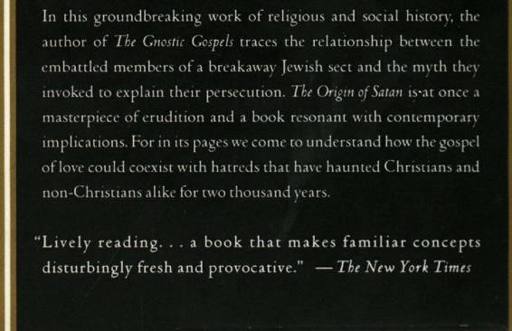The Origin of Satan
Read The Origin of Satan Online
Authors: Elaine Pagels
Tags: #Religion, #Christianity, #History, #Christian Theology, #General, #Angelology & Demonology





Acclaim for
ELAINE PAGELS’S
The Origin of Satan
“Pagels has achieved something important. . . . Thoughtful
scholarly works that are also original and adventurous are not
common.
The Origin of Satan
is such a work, and we should be
correspondingly grateful.”
—New York Review of Books
“Illuminating and rewarding ... a very readable scholarly work ...
a model of erudition and conciseness.”
—Newsday
“Fascinating and valuable.”
—The Nation
“Lucid and closely reasoned. . . . Pagels remains always a lively
writer who discerns the human implications of esoteric texts and
scholarly disputes.”
—Chicago Tribune
“One of today’s leading interpreters of the world of early
Christianity. . . . She brilliantly shows how otherwise arcane
theology is related to the social context in which it was
conceived.”
—Milwaukee Journal Sentinel
“Succeeds wonderfully”
—San Francisco Chronicle
ELAINE PAGELS’S
The Origin of Satan
Elaine Pagels is Harrington Spear Paine Professor of
Religion at Princeton University. Professor Pagels
received her doctorate from Harvard University in 1970
and has taught at Barnard College, where she chaired
the Department of Religion, and at Columbia
University. She was responsible for editing several of
the texts from Nag Hammadi and has written four other
books:
The Johannine Gospel in Gnostic Exegesis
;
The
Gnostic Paul:
Gnostic Exegesis of the Pauline Letters
;
The
Gnostic Gospels
; and
Adam, Eve, and the Serpent
. The
Gnostic Gospels won the National Book Critics Circle
Award and the National Book Award. Professor Pagels
was awarded a MacArthur Fellowship in 1981. She lives
and teaches in Princeton, New Jersey.
ALSO BY ELAINE PAGELS
Adam, Eve, and the Serpent
The Gnostic Gospels
The Johannine Gospel in Gnostic Exegesis
The Gnostic Paul:
Gnostic Exegesis of the Pauline Letters
THE ORIGIN OF SATAN
[THIS PAGE WAS INTENTIONALLY LEFT BLANK]


THE
ORIGIN OF SATAN
ELAINE PAGELS
Vintage Books
A DIVISION OF RANDOM HOUSE, INC.
NEW YORK
FIRST VINTAGE BOOKS EDITION, MAY 1996
Copyright • 1995 by Elaine Pagels
Al1 rights reserved under International and Pan-American
Copyright Conventions. Published in the United States by
Vintage Books, a division of Random House, Inc., New York, and
simultaneously in Canada by Random House of Canada Limited,
Toronto. Originally published in hardcover by Random House,
Inc., New York, in 1995.
The Library of Congress has cataloged the
Random House edition as follows:
Pagels, Elaine.
The origin of Satan / Elaine Pagels. — 1st ed.
p. cm.
Includes bibliographical references and index.
ISBN 0-679-40140-7
1. Devil—Biblical teaching. 2. Bible. N. T. Gospels—Criticism,
interpretation, etc. 3. Christianity and antisemitism. I. Title.
BS2555.6.D5P34 1995
235'.47—dc20 95-7983
Vintage ISBN: 0-679-73118-0
Printed in the United States of America
10 9 8 7 6 5
To SARAH AND DAVID
with love
A C K N O W L E D G M E N T S
This book is based upon research originally presented, for the
most part, in scholarly publications (cited at the beginning of
each chapter's notes) and revised to make it more generally
accessible. During the six years of research and writing, I have
consulted with many scholars and friends. First I wish to thank
John Gager, Rosemary Reuther, and Krister Stendahl, whose
research and teaching have contributed so much to illuminate
the issues. I especially thank those colleagues and friends who
read the manuscript and offered corrections and criticism: Glen
Bower-sock, Elizabeth Diggs, Howard Clark Kee, Kent
Greenawalt, Wayne Meeks, Sharon Olds, Eugene Schwartz,
Alan Segal, Peter Stern, and S. David Sperling; and those who
offered comments and criticism on portions of the work as it was
in progress, including John Gager, Vernon Robbins, and James
Robinson, who read the sections on New Testament sources;
Steven Mullaney, who read and commented on the sources
presented in chapter 1; John Collins, Louis Feldman, Paul
Hanson, Martha Himmelfarb, Helmut Koester, Doron Mendels,
and George Nickelsburg, who read and commented on the
sources presented in chapter 2; and Peter Brown, who read and
commented on the article on which part of chapter 6 is based. No
doubt each of these colleagues will disagree with some of my
conclusions, for which I must take responsibility. Research for
this book began when I was a visitor at the School of Historical
Studies at the Institute for Advanced Study
x / ACKNOWLEDGMENTS
in 1990-91 and resumed there in 1994-95. I am most grateful to
the members of that school for their gracious hospitality in
making available to me, as to many others, the serene and
collegial environment the Institute offers. I owe special thanks to
Ruth Simmons, Vice Provost of Princeton University, to Jeffrey
Stout, Chair of the Department of Religion, and to Robert
Gunning, Dean of the Faculty, for making possible a leave to
complete the research and writing in 1994-95, and to the
National Endowment for the Humanities for the fellowship that
supported me during that year.
I wish to thank my colleagues in the Department of Religion at
Princeton University, both for conversations that have
contributed much to the process and for their grace and
understanding during these years, and also to thank the graduate
students who struggled through the Greek texts with me in our
seminar: Gideon Bohack, Robert Cro, Nicola Denzey, Obery
Hendricks, Anne Merideth, Sharon Hefetz, and Joel Walker.
There are certain people without whose participation I cannot
imagine having written this book. I am very fortunate and
privileged to have worked with Jason Epstein as editor, and
deeply appreciate the insight, wit, and passion for clarity he has
brought to this process, along with his enthusiastic support.
Helaine Randerson has worked on the manuscript through the
entire process, offering incisive comments and editorial criticism
along with her astonishingly expert manuscript preparation.
John Brockman and Katinka Matson have offered encouragement
on the project from the beginning, and have contributed in
innumerable ways. I am grateful, too, to Anne Merideth for her
collaboration in finding research materials, as well as for her
excellent judgment on many issues we discussed. I have
appreciated and enjoyed working with Virginia Avery, whose
editorial suggestions have improved the text; and also thank Joy
de Menil for all that she contributed.
Finally, I am grateful to the many friends whose presence and
personal support in ways known to each of them helped see me
through these difficult years since my husband's death, and
mention in particular Malcolm Diamond, Elizabeth Diggs, Sarah
ACKNOWLEDGMENTS / xi
Duben-Vaughn, Kent Greenawalt, my brother and sister-in-law,
Ralph and Jane Hiesey, Kristin Hughes, Elizabeth and Niccola
Khuri, Emily McCulley, Sharon and David Olds, Albert Rabo-
teau, Kathy Murtaugh, and Margot Wilkie.